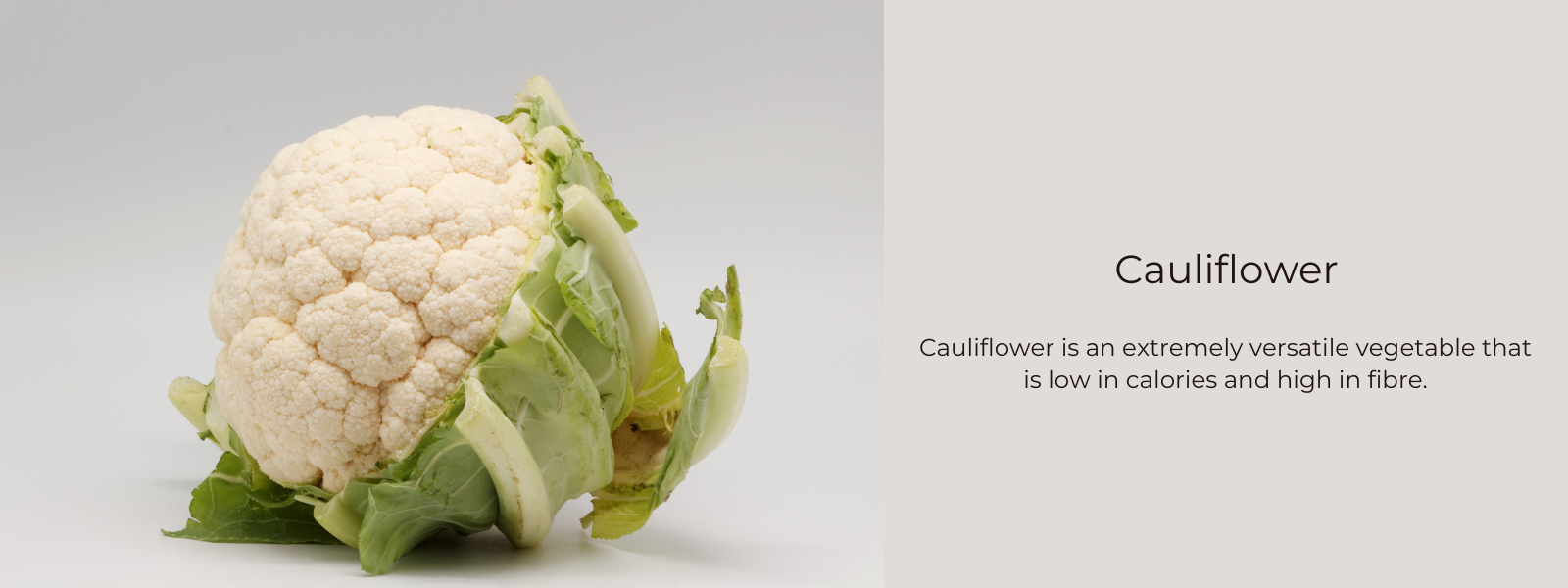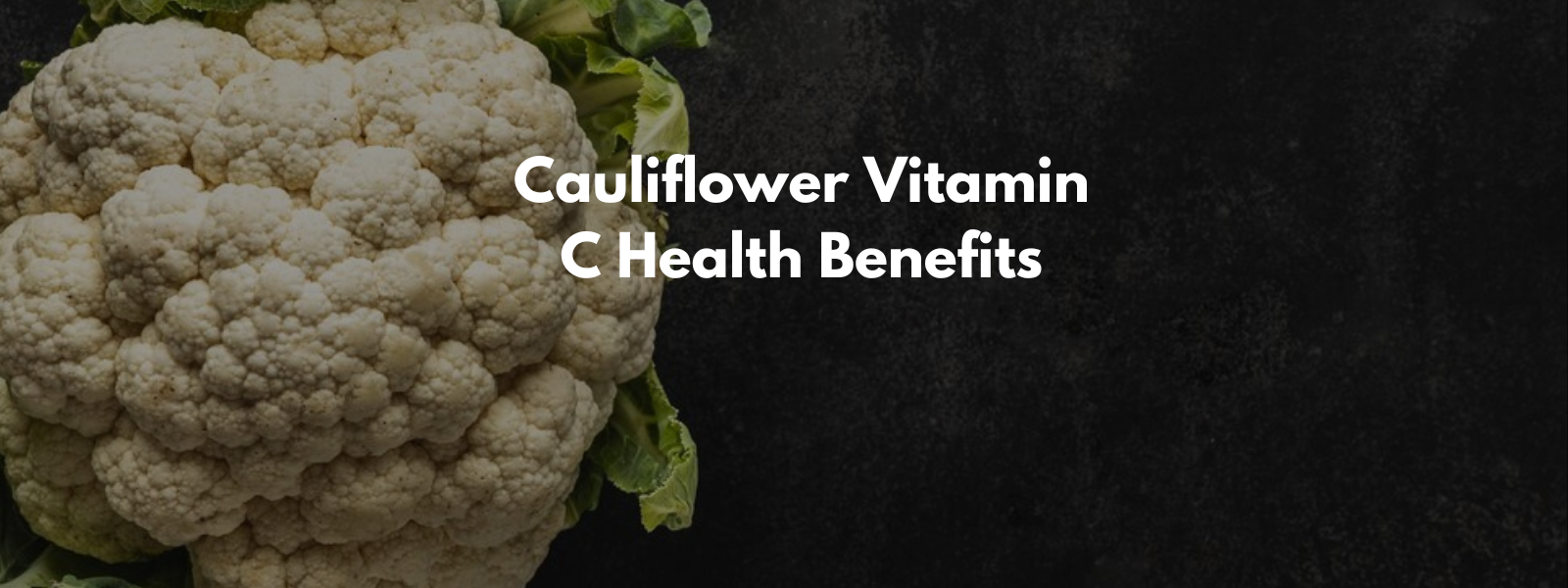Cauliflower has gained significant popularity in recent years, often being used as a low-carb substitute for grains and starchy vegetables. However, it’s much more than just a keto-friendly alternative to rice or potatoes. Packed with essential nutrients, antioxidants, and fiber, cauliflower offers a wide range of health benefits that make it a valuable addition to any diet. Whether you're trying to lose weight, improve digestion, or protect your body from disease, cauliflower has something to offer.
Table of Contents
- 1. Nutrient-Dense and Low in Calories
- 2. Rich in Antioxidants: Protects Against Chronic Diseases
- 3. Supports Digestion and Gut Health
- 4. Supports Weight Loss
- 5. Anti-Inflammatory Benefits
- 6. Improves Bone Health
- 7. Supports Detoxification
- 8. Enhances Brain Health
- 9. How to Incorporate Cauliflower into Your Diet
- 10. Conclusion
Nutrient-Dense and Low in Calories
Cauliflower is extremely nutrient-dense, meaning it provides a lot of essential vitamins and minerals without many calories. One cup of raw cauliflower contains only about 25 calories, making it an excellent choice for those looking to manage their calorie intake while ensuring they get enough nutrients. Despite being low in calories, cauliflower is rich in:
- Vitamin C: A powerful antioxidant that supports immune function, skin health, and collagen production.
- Vitamin K: Essential for blood clotting and bone health.
- Folate: Important for cell division and the production of DNA.
- Potassium: Helps regulate blood pressure and maintain proper heart and muscle function.
- Fiber: Supports digestion and contributes to feelings of fullness.
This combination of low calories and high nutrients makes cauliflower an excellent food for overall health, weight management, and disease prevention.
Rich in Antioxidants: Protects Against Chronic Diseases
Cauliflower is a rich source of antioxidants, which help protect your cells from oxidative stress and reduce inflammation in the body. Oxidative stress is a condition caused by an imbalance between free radicals and antioxidants in the body, and it can lead to chronic diseases such as heart disease, cancer, and diabetes.
- Sulforaphane: Cauliflower contains a compound called sulforaphane, a potent antioxidant that has been shown to reduce the risk of cancer by protecting cells from DNA damage and inhibiting the growth of cancer cells. Sulforaphane is also believed to have anti-inflammatory properties, making it beneficial for heart health and reducing the risk of neurodegenerative diseases like Alzheimer's and Parkinson's.
- Glucosinolates and Isothiocyanates: These compounds, also found in cauliflower, play a key role in detoxifying the body and have been linked to a reduced risk of certain types of cancer, particularly lung, colon, breast, and prostate cancer.
By incorporating cauliflower into your diet, you can benefit from its antioxidant properties and potentially lower your risk of chronic diseases.
Supports Digestion and Gut Health
Cauliflower is high in dietary fiber, which plays an essential role in supporting digestion and maintaining a healthy gut. A high-fiber diet helps prevent constipation by adding bulk to the stool and promoting regular bowel movements. Additionally, fiber acts as a prebiotic, feeding the beneficial bacteria in your gut, which can improve digestion, nutrient absorption, and immune function.
- Promotes Gut Health: The fiber in cauliflower helps support the growth of healthy bacteria in the gut, which is linked to a lower risk of digestive disorders, including irritable bowel syndrome (IBS) and inflammatory bowel disease (IBD).
- Reduces Inflammation: The fiber and antioxidants in cauliflower work together to reduce inflammation in the gut and throughout the body. This can be particularly helpful for those dealing with chronic digestive conditions and autoimmune disorders.
Supports Weight Loss
Cauliflower is a great food to include in a weight loss plan because it’s low in calories and carbohydrates, yet high in fiber and water content. Foods that are high in fiber and water help you feel fuller for longer, reducing the likelihood of overeating and snacking between meals.
- Low in Carbs and Calories: Cauliflower’s low carbohydrate content makes it a perfect option for those following low-carb or ketogenic diets. It can be used as a substitute for rice, mashed potatoes, or even pizza crust, allowing you to enjoy your favorite dishes without the excess carbs or calories.
- High Satiety Factor: Fiber adds bulk to your meals, which helps you feel satisfied with fewer calories. This can prevent overeating and help with portion control, leading to gradual and sustainable weight loss.
Anti-Inflammatory Benefits
Chronic inflammation is at the root of many diseases, including heart disease, arthritis, and diabetes. Cauliflower contains several compounds that have anti-inflammatory properties, helping to reduce inflammation and protect your body from chronic disease.
- Choline: Cauliflower is a good source of choline, an essential nutrient that plays a role in maintaining healthy cell membranes, reducing inflammation, and supporting brain health. Choline deficiency can lead to increased inflammation and a higher risk of liver disease and heart disease.
- Antioxidants and Phytonutrients: In addition to sulforaphane, cauliflower contains other antioxidants and phytonutrients that help reduce oxidative stress and inflammation in the body, further supporting overall health and disease prevention.
Improves Bone Health
Cauliflower contains nutrients that are essential for maintaining strong and healthy bones. It’s a good source of vitamin K, which is crucial for bone health because it helps improve calcium absorption and reduces the risk of fractures. Additionally, vitamin K helps prevent the buildup of calcium in the blood vessels, which can lower the risk of cardiovascular disease.
- Prevents Bone Loss: The combination of vitamin K, calcium, and magnesium in cauliflower supports bone density and reduces the risk of osteoporosis, particularly in older adults.
- Improves Calcium Absorption: Vitamin K plays a role in regulating calcium in the body, making sure it is directed to the bones and not deposited in soft tissues like the arteries.
Supports Detoxification
Cauliflower contains compounds that support the body’s natural detoxification processes. The glucosinolates in cauliflower activate enzymes that help detoxify the body by breaking down harmful toxins and eliminating them from the system. This detoxification process is essential for maintaining liver health and reducing the buildup of harmful substances that can contribute to disease.
- Liver Health: The detoxifying properties of cauliflower support liver function by helping the liver process and eliminate toxins more efficiently. This can reduce the risk of liver disease and support overall metabolic health.
- Detoxification Support: By boosting your body’s ability to detoxify, cauliflower can help protect against the harmful effects of environmental pollutants, chemicals, and other toxins that we encounter in daily life.
Enhances Brain Health
Cauliflower is a good source of choline, a nutrient that plays a key role in brain development and function. Choline is necessary for the production of acetylcholine, a neurotransmitter that is involved in learning, memory, and mood regulation.
- Cognitive Function: Choline helps protect brain cells and supports cognitive function, making it important for memory and learning. Adequate choline intake may reduce the risk of cognitive decline and neurodegenerative diseases, such as Alzheimer's disease.
- Pregnancy and Development: Choline is particularly important during pregnancy, as it supports fetal brain development and can help prevent neural tube defects.
How to Incorporate Cauliflower into Your Diet
Cauliflower is incredibly versatile and can be used in various ways to create healthy, delicious meals. Here are some ideas to incorporate more cauliflower into your diet:
- Cauliflower Rice: Pulse raw cauliflower in a food processor to create a low-carb, grain-free alternative to rice.
- Mashed Cauliflower: Steam and mash cauliflower as a healthier substitute for mashed potatoes.
- Roasted Cauliflower: Toss cauliflower florets with olive oil, garlic, and your favorite spices, then roast until golden brown for a flavorful side dish.
- Cauliflower Pizza Crust: Make a low-carb pizza crust using riced cauliflower, cheese, and eggs for a guilt-free pizza experience.
- Cauliflower Soup: Blend cooked cauliflower with vegetable broth, garlic, and herbs for a creamy, nutrient-rich soup.
Conclusion
Cauliflower is more than just a low-carb substitute—it’s a nutrient powerhouse that offers numerous health benefits. From supporting weight loss and digestion to protecting against chronic diseases and promoting brain health, cauliflower can play a valuable role in your diet. Its versatility makes it easy to incorporate into a wide variety of dishes, allowing you to enjoy its benefits in a delicious and satisfying way. Whether you’re looking to lose weight, detoxify your body, or simply boost your overall health, cauliflower is a must-have addition to your meals.












Leave a comment